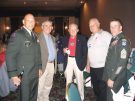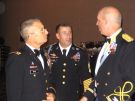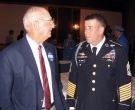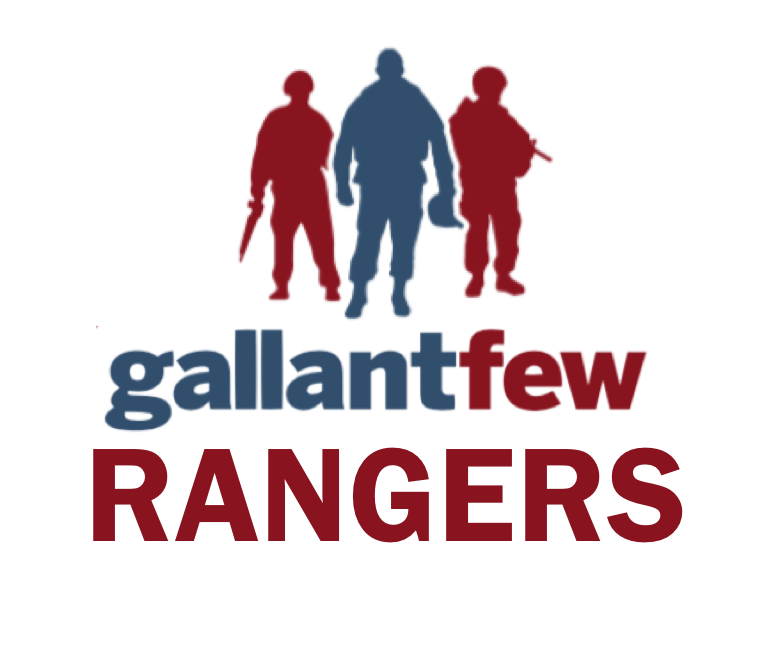Retired Command Sgt. Maj. Robert “Bob” Gallagher — who parachuted into Panama during Operation Just Cause, served as a platoon sergeant with Task Force Ranger in the Mogadishu, Somalia, battle made famous by “Black Hawk Down,” and fought on despite being wounded as Task Force 3rd Battalion, 15th Infantry, made its way to Baghdad in 2003 — was 52 years old.
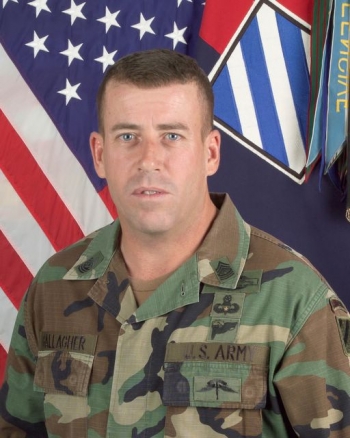 CSM Robert Gallagher
CSM Robert Gallagher from Bayonne, New Jersey
CSM Gallagher served with: 3rd Ranger Battalion
Born in 1962, Ranger Gallagher was 52 years old at the time of his death in 2014.
Complete biography is below the photo gallery
CSM Robert Gallagher 's Biography
Retired Command Sgt. Maj. Robert “Bob” Gallagher — who parachuted into Panama during Operation Just Cause, served as a platoon sergeant with Task Force Ranger in the Mogadishu, Somalia, battle made famous by “Black Hawk Down,” and fought on despite being wounded as Task Force 3rd Battalion, 15th Infantry, made its way to Baghdad in 2003 — was 52 years old.
During his military service, CSM Robert Gallagher also served in 3rd Bn 15th INF
A decorated soldier who participated in major military actions spanning three decades and spent the last few years of his career helping fellow wounded warriors was found dead in his Georgia home Oct. 13 of natural causes.
Retired Command Sgt. Maj. Robert "Bob" Gallagher — who parachuted into Panama during Operation Just Cause, served as a platoon sergeant with Task Force Ranger in the Mogadishu, Somalia, battle made famous by "Black Hawk Down," and fought on despite being wounded as Task Force 3rd Battalion, 15th Infantry, made its way to Baghdad in 2003 — was 52 years old.
His death was a result of a heart condition for which he was receiving treatment, his son, Patrick Gallagher, said in a Wednesday interview. Third Infantry Division, the parent unit of the task force in which Gallagher served during Operation Iraqi Freedom, announced his death in a Facebook post.
Gallagher relied heavily on that combat experience in his last job before retirement, serving as the command sergeant major for the Army’s Wounded Warrior Program.
"You know, I don’t say this lightly, but Bob is probably one of, probably the best soldier I ever served with," said retired Col. Greg Gadson, who served as the program’s director from 2010 to 2012. "That man really cared about soldiers."
"I know a lot about this man’s life, and he’s been through a lot. I almost come to tears thinking about what he overcame," Gadson said.
Gallagher was born in Bayonne, New Jersey, in 1962 and joined the Army in 1981, according to an online obituary hosted by the Richmond Hill Funeral Home. He earned a Silver Star, two Bronze Stars (one with "V" device) and two Purple Hearts, among other awards and decorations.
The Silver Star came in 2003 for his actions during OIF, in which TF 3-15 Infantry advanced from Kuwait to Baghdad, often fighting its way through fierce Iraqi resistance. Gallagher gave a speech to his unit before the fight began, turning to unit commander Lt. Col. Stephen Twitty with a simple message, according to a 2003 Army Magazine article: "Sir, we are prepared for battle."
Gallagher suffered a leg wound during the fight but continued directing his men. It wasn’t his first battlefield wound, having been shot in the arm in Somalia in 1993, according to one of the Philadelphia Inquirer pieces written by Mark Bowden that would become the basis for the "Black Hawk Down" book and movie.
"The best day and the worst day of my life was when I served in Mogadishu, Somalia, on October 3, 1993, as a part of Task Force Ranger," Gallagher said in a 2010 interview published as he took over his post at the Wounded Warrior Program.
"It was the worst day, because we lost 18 Soldiers and 84 others, including myself, were wounded. It was the best day of my life because it showed the incredible performance of our warriors in long-protracted battle under extraordinary circumstances in an urban environment. Throughout it all, the warriors that fought that day performed in a manner that was consistent with the values of our nation, and I was very proud of that."
Patrick Gallagher said his father rarely discussed his combat experience at home, but said "I could tell there was a distinct change with him after Somalia."
"He was a pretty private person as far as his work life went," Patrick Gallagher said. "What my brother and I knew was what was widely publicized. It’s not something we really talked about."
Gallagher began his tour with the Wounded Warrior Program nearly 20 years after Somalia and almost a decade after Iraq. While family and co-workers said some of the office work and ribbon-cuttings didn’t appeal to him, they said he relished the chance to help others who understood the trauma of combat.
"He was a guy who was all about action, but his action could be defined in many ways," said Sean McCarthy, a friend of Gallagher’s and a medically retired Marine. "Primarily, his focus was on taking care of his troops, regardless of their ranks."
That focus, Gadson said, allowed Gallagher to make his voice heard to leadership — clearly.
"You can be intimidated by rank, status and position, I don’t care who you are, but Bob wasn’t," Gadson said. "He always displayed that candor, that courage. And that’s what you want out of a sergeant major.
"It was nice to have a battle buddy that, whether we saw each other or not, we were about taking care of people."
McCarthy and Gallagher became close thanks in part to their shared status as combat vets, but they were also drawn together by Team River Runner — McCarthy formerly served as coordinator of the Fort Belvoir, Virginia, chapter of the nationwide nonprofit program that offers kayaking trips to wounded warriors and others in the military family.
"He came over and joined in and found a whole new passion for life that he had not been exposed to before," McCarthy said.
Gallagher had planned to set up a Team River Runner branch in the Savannah area in retirement, friends and family said — McCarthy said the retired NCO had already purchased the kayaks. It was part of a post-service life that McCarthy said Gallagher hadn’t planned out in full, but knew it was time to start.
"He enjoyed his time with the Army," McCarthy said, "but he knew it was time to move on because he no longer could be the active sergeant major that he always prided himself on being. He wanted to move over, make room for the younger guys."
Gadson, who lost both his legs in Iraq in 2007 and retired earlier this year, credited Gallagher for helping him make an impact in the final years of his time in uniform.
"Both of us, at that point in our careers and the job we had, there was nothing to gain," Gadson said. "There weren’t any more hills for me to conquer. ... It felt like it was about all I could do to give back, to make a difference. And he helped me do that."
A memorial ceremony is scheduled for Oct. 31 at Fort Benning, Georgia, home of the 75th Ranger Regiment, family members said. Gallagher is to be buried at Arlington National Cemetery, but a date has not been determined, according to family members and the funeral home.
He is survived by his wife, Denene, and sons Patrick and Sean.
<a href="http://www.armytimes.com/article/20141022/NEWS/310220069/CSM-who-fought-Panama-Somalia-Iraq-dies-52 target="_blank">
Article Courtesy The Army Times
</a>
<hr>
<a href="http://books.google.com/books?id=ju9RAcRiShsC&lpg=PA143&ots=t5whIvUX2Q&dq=CSM%20Robert%20Gallagher&pg=PA143#v=onepage&q=CSM%20Robert%20Gallagher&f=falsetarget="_blank">
Read a book excerpt about him during the Iraq War here</a>
<hr>
<a href="http://www.ausa.org/publications/armymagazine/archive/2003/6/Documents/Steele_0603.pdf" target="_blank">Army Magazine Article - "Baghdad: The Crossroads"</a>
<HR>

